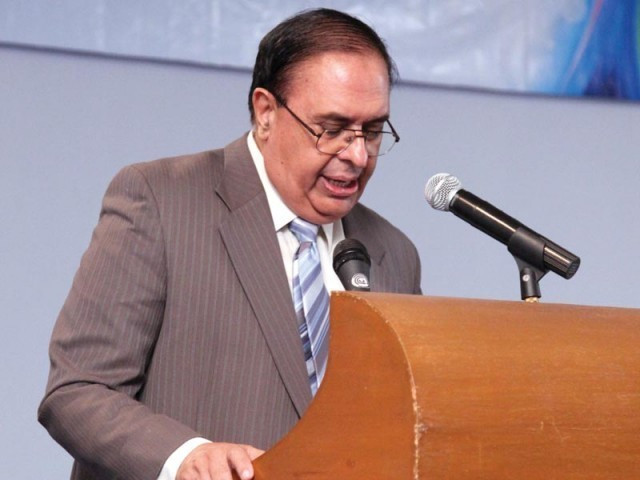‘We are converting to a knowledge-based economy from an agriculture-based economy’
Around 11,000 scholarships were awarded to students to study in European universities.

‘We are converting to a knowledge-based economy from an agriculture-based economy’
A plan to weaken the Higher Education Commission of Pakistan was alleged to have been conceived by 51 parliamentarians with fake degrees and 250 of their colleagues to escape accountability.
With over 500 young people in attendance, the former federal minister for science and technology, Dr Attaur Rehman, spoke to them on what he termed ‘willful deterioration of the higher education system at the hands of corrupt politicians.’ Dr Rehman, who had remained chairman of the HEC, was invited as the chief guest at the opening ceremony of the leadership conference which was organised by the Youth Parliament at the Pearl Continental hotel on Thursday.
“With the initiatives taken by the HEC, Pakistan was poised to make a major breakthrough and evolve into a knowledge economy from an agricultural economy,” he said. He lamented that an official notification was issued on November 30, 2010 to fragment the HEC and break it into pieces.
Rehman, however, being the Pakistan Academy of Science president intervened and approached the apex court to receive an order which declared the fragmentation of the HEC to be unconstitutional. “The government, however, slashed the commission’s budget by 50 per cent and a number of development programmes in universities have come to a halt,” he said.
Making a reference to an article in The Hindustan Times, he said, “The rapid developments posed a threat to India, but we ourselves are our own worst enemy.” He added we had this aim that Pakistan should not equal India but outdo it in terms of research outpost.
He also highlighted the fact that during his term as minister, he successfully convinced the former president, Pervez Musharraf, to increase the education budget by 2,400 per cent and that of science and technology by 1,600 per cent.
According to Dr Rehman, around 11,000 scholarships were awarded to students to study abroad at mostly European universities.
He said that the world’s largest Fulbright scholarship programme was initiated, with a research grant worth $100,000 dollars and a job arranged for the recipient a year prior of returning to Pakistan.
The HEC also developed the Pakistan Education and Research Network (PERN) through which 60,000 textbooks and 25,000 research journals were made accessible to students at their educational institutions. The students’ enrolment at the universities climbed up to 850,000 from 270,000 in just nine years while the universities produced 3,685 PhDs in such a short span which earlier were 3,200 in total from 1947 till 2000.
As for technological development, Dr Rehman said that fiber-optics lines which were laid in 40 cities in the year 2000, expanded to 400 cities allowing access to internet in nearly 1,000 cities and villages from just 29 cities previously.
After concluding his speech, all those in attendance gave a standing ovation to Dr Rehman, lauding the efforts made by him towards for the education sector of Pakistan. Following the ceremony, the conference had a number of sessions which provided guidance to those who had participated in the event. “All in all we had received around 3,000 registration requests from Tharparkar to Chitral,” said the Youth Parliament’s chairman, Rizwan Jaffar. “Those who have been selected for participation are fortunate and should try to avail this opportunity to the fullest.”
Published in The Express Tribune, July 20th, 2012.



















COMMENTS
Comments are moderated and generally will be posted if they are on-topic and not abusive.
For more information, please see our Comments FAQ